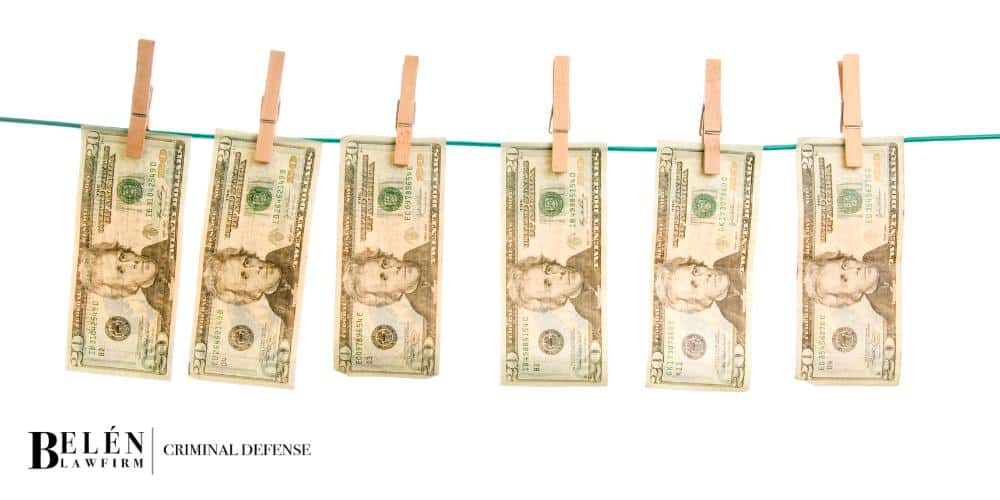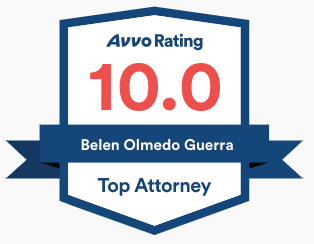White Collar Crime Defense Attorney
We Defend Those Accused of Every Type of Crime
Home » Criminal Defense » White Collar Crime Attorney in Phoenix
PRACTICE AREAS
White Collar Criminal Attorney in Phoenix
Professional & Experienced Lawyer – Available 24/7

In Arizona, prosecutors remain diligent when it comes to white collar crime cases, and they often dedicate a large amount of time and resources to them. As such, these are allegations you must take very seriously. If you’ve been accused or charged with a white-collar offense in Arizona, you’ll need the help of a knowledgeable Phoenix white collar criminal defense lawyer immediately.
At the Belén Law Firm, we’ve dealt with defendants at both the state and federal levels, so we know what it takes to get these charges reduced, withdrawn, or even dismissed. We may even be able to get an investigation stopped before the charges are brought forward. Top Phoenix criminal defense attorney Belén Olmeda Guerra has significant experience fighting white collar charges. She makes the process less frightening for you while aggressively fighting for your freedom and future. To schedule an appointment for a free consultation to explore your white collar criminal defense options, call 602-715-0908 as soon as possible.
What is White Collar Crime?
White collar crimes involve deception, concealment, or a breach of trust, according to the Federal Bureau of Investigations (FBI). The label refers to a wide range of financially driven, nonviolent criminal acts motivated by a desire to gain a personal or business advantage, as well as a goal of obtaining or avoiding the loss of money, services, or property.
The term white collar crime is used to describe nonviolent crimes perpetrated in the workplace, because historically, men of higher social status dressed in a suit, tie, and white collared shirt for work. Therefore, these crimes are named after the type of clothing worn by the stereotypical perpetrators.
Fraud, embezzlement, and other white-collar crimes are typically punishable by lengthy prison time and hefty fines. That’s because these crimes often include extremely large sums of money and many victims, which many people overlook. Additionally, federal prosecutors are frequently harsh in sentencing and convicting defendants both to punish them and hopefully deter others from engaging in similar behavior.

White Collar Crime Examples
There are several different instances of white collar crime. Perhaps the most notorious and significant cases, however, include Charles Ponzi’s schemes, the Enron Corporation, and the case of Bernie Madoff.
Types of White Collar Crimes
There are two main classifications of white collar crime: individual and corporate. Individual crimes are those committed by a single person or a small group of people. Corporate crime is committed by a private company’s employees for the advantage of their employer. Both individual and corporate white collar crimes are often prosecuted in federal court.
Aside from whether the crime occurred at an individual level or corporate level, there are a number of offenses that may be committed that constitute white collar crime. The most common types of white collar offenses include:
Embezzlement
Perhaps the most well-known type of white collar crime is what is known as embezzlement. Embezzlement in Arizona is the theft or misappropriation of money that does not belong to you, usually occurring in a business-type setting. Typically, it is charged along with fraud.
Fraud
Fraud entails deception and a breach of trust to achieve an unfair or illegal advantage, often causing harm or loss to a firm or an individual. There are several different types of fraud including healthcare fraud, wire fraud, and check fraud, to name a few.
Forgery
Forgery is the crime of making a false copy of something or signing someone else’s name to a document. Fraudulent documents include contracts, financial applications, or checks forged with false signatures. Art and currencies are both susceptible to forgery, as well.
Bribery
This offense refers to giving something of value to someone in a position of power, such as a public official, for example, in order to influence that person’s actions or decisions. If a public official, government employee, or elected representative makes a request for something of value, this is also considered bribery. Bribes must be given or taken with “corrupt intent” to be prosecuted.
Extortion
Extortion is the obtaining of property, money, or favors illegally and through compulsion. The most well-known kind of extortion is blackmail, which is based on the threat of releasing the target’s private information. Public corruption is another common form of extortion. This occurs when a public official trades favors for a bribe, such as accepting a request or performing a specified action.
Counterfeiting
The illegal production of fake goods, documents, or currencies is what is referred to as counterfeiting. Perpetrators of this crime typically copy and sell reproductions as copyrighted, trademarked, or other legally protected information or products. The most typically counterfeited things include money, driver’s licenses, passports, designer products, and Treasury Bonds.
Racketeering
People usually associate the federal RICO law with this crime (Racketeers Influenced Corrupt Organizations Act). The state of Arizona, though, has anti-racketeering laws of its own, despite racketeering being a federal crime.
In Arizona, racketeering can refer to a variety of activities. As defined in A.R.S. 13-2301, racketeering refers to “any act, including any preparatory or completed offense, that is chargeable or indictable under the laws of the state or country in which the act occurred.” In this case, it includes money laundering, counterfeiting, making false claims, and printing false information about land for sale or lease.
Extortion, bribery, forgery, prostitution, terrorism, human trafficking, and other blue collar crimes are also included in racketeering.
Money Laundering
Money laundering, also referred to as “cleaning dirty money,” is the process of hiding the source of illegally obtained money to make it appear legitimate. Cleaning money typically involves separating funds into multinational banks in complex banking transactions. Money laundering schemes often progress through three stages, including placement/structuring, layering, and integration.
Antitrust Violations
Antitrust laws are aimed at encouraging free and open markets. These laws restrict unfair competition by limiting the power of any one corporation or firm. Price fixing, bid rigging, price discrimination, boycotts, tying, and monopolization are all examples of violations of these antitrust laws. However, the two most common types of antitrust violations are agreements to suppress competition and attempts at acquiring a monopoly.
Regardless of the type of offense committed, all cases involving white collar crime are complicated and require the experienced counsel of a Phoenix white collar crimes lawyer to reach a favorable outcome.

What are the Penalties for White Collar Crimes?
The commission of any white collar crime may result in a wide range of penalties, though they are often severely punished. The state treats these offenses very seriously, as they deprive both organizations and individual victims of large sums of money and/or assets. The punishment for white collar crimes depends on the type of case and conviction, as well as whether it is a state or federal case. Some white collar offenses may be considered misdemeanors and employ relatively short jail sentences, while other offenses are classified as federal felonies and carry significantly longer prison terms. In addition to the prospect of prison time, white collar criminals must often repay whatever money was gained via their illegal activities.
If you’ve been charged with a white collar crime of any kind, contact the Phoenix criminal defense attorneys at Belén Law Firm right away. Attorney Belén Olmedo Guerra helps you understand the charges leveled against you and will put together the strongest possible defense strategy for you.
White Collar Crime Attorney Near Me
White collar cases, unlike many other criminal charges, are typically only presented after lengthy criminal investigations have taken place. As such, the targets of the inquiry are typically made aware of the investigation before any charges are filed. This presents an excellent opportunity to get ahead of the investigation by obtaining an experienced attorney. In some cases, doing so can help avoid charges ever being brought.
When you’re accused of a crime, your freedom, future, professional career, and social standing are all in serious jeopardy. With the Belén Law Firm, a Phoenix criminal defense firm, our lawyers do their due diligence to ensure you can establish a white collar defense strategy that protects and preserves your freedom. Our criminal defense attorneys stand ready to take on white collar criminal cases involving government investigations and various state and federal regulatory agencies. To talk with an experienced Phoenix white collar crimes lawyer and ensure your case receives unmatched legal representation and defense, call 602-715-0908 to schedule your free consultation today.
Set Up Your Free Consultation
What Our Clients Say



















